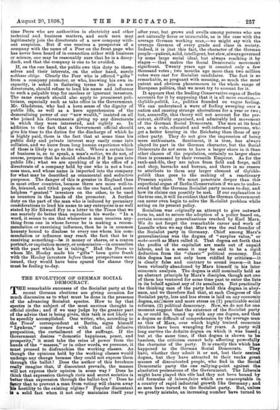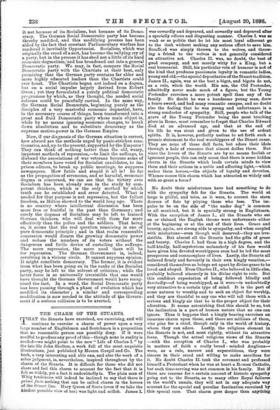THE EVOLUTION OF GERMAN SOCIAL DEMOCRACY. T HE remarkable successes of
the Socialist party at the recent German elections are giving occasion for much discussion as to what must be done in the presence of the advancing Socialist spectre. How to lay that spectre is the subject of the most anxious thought in official circles ; and if we may judge by the greater part of the advice that is being given, this task is not likely to be speedily accomplished. One writer, who, according to the Times' correspondent at Berlin, signs himself " Lynkeus," comes forward with that old delusive proposition, the curtailment of the suffrage. If the Government desires "domestic happiness, peace, and prosperity," it must take the reins of power from the hands of the "masses," or in other words, we presume, it must proceed to disfranchise the working classes. As though the opinions held by the working classes would undergo any change because they could not express them through the ballot ! Does the author of this brochure really imagine that, if discontent prevails, the masses will not express their opinion in some way ? Does he think that expression through riots and secret societies is better than expression through the ballot-box ? Does he fancy that to prevent a man from voting will charm away his hostility to the existing regime ? Popular discontent 11 a solid fact when it not only maintains itself year after year, but grows and swells among persons who are not naturally fierce or intractable, as is the case with the average German working man,—we might say with the average German of every grade and class in society. Indeed, it is just this fact, the character of the German people—patient, solid, intelligent, but slow, always governed by some large social ideal, but always reaching it by stages — that makes the Social Democratic movement significant. Twenty years ago it counted only a few thousand votes ; two months ago more than two million votes were cast for Socialist candidates. The fact is se remarkable, so pregnant with meaning, so much the most patent and obvious phenomenon in the whole range of European politics, that we must try to account for it.
It appears that the leading Conservative organ of Berlin accounts for it by supposing that it is all mere emotion,— Gefials-politik, i.e., politics founded on vague feeling. We can understand a wave of feeling sweeping over a nation and causing strange aberrations for a year or two ; but, assuredly, this theory will not account for the per- sistent, skilfully organised, and admirably led movement of the German Social Democrats. The men at its head are, as a rule, educated and well-informed persons, whc get a better hearing in the Reichstag than those of any- other party. They do not give the impression of being mere enthusiasts. Sentiment, it is true, has always played its part in the German character, but the Social Democrats do not seem to have a larger share in it than, other classes of the population, certainly no larger share than is possessed by their versatile Emperor. As for the rank-and-file, they are taken from field and forge, mill and shop, barracks and bureau, and there is no reason to attribute to them any larger element of Gefiihls- politik than goes to the making of a reactionary Prussian squire. We must penetrate deeper than this superficial organ of Berlin Conservatism if we are to under- stand what the German Socialist party means to-day, and how its claims can possibly be met. If our explanation is the true one, it will be evident that the German Government can never even begin to solve the Sucialist problem while acting on its present policy.
Socialism was originally an attempt to give outward form to, and to secure the adoption of a, policy based on,. certain economic generalisations reached by Karl Marx. We do not forget the remarkable career and work of Lassalle when we say that Marx was the real founder of the Socialist party in Germany. Chief among Marx's generalisations was the dogma of "surplus value," or mehr-werth as Marx called it. That dogma set forth that the profits of the capitalist are made out of unpaid labour, and in a, sense it may be said to be a rigid deduction from the "classic" political economy. But this dogma has not only been riddled by criticism—it is clearly false and contrary to sound reason—it has- been virtually abandoned by Marx himself in his later economic analysis. The dogma is still nominally held as an abstract principle by Marx's disciples, though not one of them has ventured for some time past to enter the lists in its behalf against any of its assailants. But practically the thinking men of the party hold this dogma in abey- ance, and we therefore find that, at each Congress of the Socialist party, less and less stress is laid on any economic dogma, ane;more and more stress on (1) practicable social reforms, (2) political democracy. Now, we do not for one moment suggest that the existence of the Socialist party is, or could be. bound up with any one dogma, and that a dogma so difficult of comprehension by the average man, as this of Marx, over which highly trained economic thinkers have been wrangling for years. A party will long survive the definite dogma on which it was but at the same time, if that dogma is shown to be baseless, the criticism cannot help affecting powerfully the character of the party. It is exactly this which has happened to the German Social Democrats. They have, whether they admit it or not, lost their central dogma, but they have attracted to their ranks great masses of discontented people, who find in the Social Democratic party the one rallying-point against the absolutist pretensions of the Government. The Liberals might have played this role had they not been bound by old formulas of laissez-faire which are unacceptable in a country of rapid industrial growth like Germany ; and so men have turned to the Socialist party. But, unless we greatly mistake, an increasing number have turned to
it not because of its Socialism, but because of its Demo- cracy. The German Social Democratic party has become thereby modified, and this modifying process has been aided by the fact that constant Parliamentary warfare has rendered it inevitably Opportunist. Socialism, which was originally the creed of a sect, has become the rallying cry of a party, but in the process it has shed not a little of its hard economic dogmatism,'and has broadened out into a general Democratic party. We may, in fact, compare the Social Democratic party with the Chartists at their best, only premising that the German party contains far abler and more highly educated leaders than the Chartists could ever boast. The Chartists began not indeed on a dogma, but on a social impulse largely derived from Robert Owen ; yet they formulated a purely political democratic programme by which, as they thought, the needed social reforms could be peacefully carried. In the same way, the German Social Democrats, beginning purely as the disciples of a very masterful economic dogmatist, have, in the necessary course of things, been transformed into a great and fluid Democratic party whose main object is, while by no means ignoring economic changes, to break down absolutism and to substitute democracy as the supreme motive-power in the German Empire.
Now, if our diagnosis of the German situation is correct, how absurd are the methods urged by panic-stricken reac- tionaries, and, up to the present, supported by the Emperor ! They can think of nothing better than the old, weary, impotent methods of repression,—to limit the suffrage, to disband the associations of war veterans because some of their members have voted for Socialist candidates, to im- prison editors, to break up public meetings, to suppress newspapers. How futile and stupid it all is ! So far as the propagation of erroneous, and so harmful, economic dogma is concerned, we can see that the victory over Socialism has been already won in the study by com- petent thinkers, which is the only method by which truth can be established and error detected. What is needed for that purpose is not repression, but the fullest freedom, as Milton showed to the world long ago. There is no country where intellectual discussion has been more free or fruitful in the past than Germany ; and surely the dogmas of Socialism may be left to trained German thinkers, who will deal with them far more effectively than the police and the soldiers. That being BO, it seems that the real question remaining is one of pure democratic principle ; and in that realm reasonable concession would disarm the growing democratic power and reduce the numbers of its voters without the dangerous and futile device of curtailing the suffrage. The more repression, the more need there will be for repression. The German Government is, indeed, revolving in a vicious circle. It cannot suppress opinion. It might conciliate democracy. The former, it is evident from what has been going on in the ranks of the Socialist party, may be left to the solvent of criticism ; while the latter force is so universally irresistible that one would have thought the German Government would have recog- nised the fact. In a word, the Social Democratic party has been passing through a phase of evolution which has modified its character ; a similar and corresponding modification is now needed in the attitude of he Govern- ment if a serious collision is to be averted.



































 Previous page
Previous page